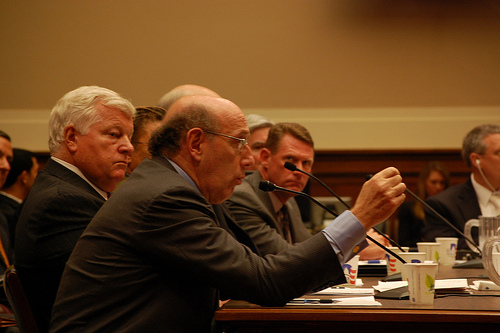
talkradionews/Flickr
A Louisiana judge ruled Wednesday that Kenneth Feinberg, the administrator of the $20 billion Gulf coast recovery fund, can’t call himself “independent.”
The Obama administration tapped Feinberg to determine how the money BP agreed to put in the fund would be dolled out to those affected by the massive oil spill in the Gulf of Mexico. But the fact that BP is paying Feinberg for his services (and paying him pretty well, I might add) has prompted a good deal of criticism. US District Judge Carl Barbier ruled on Wednesday that Feinberg must fully disclose his ties to BP in his conversations with Gulf coast residents seeking money from the Gulf Coast Claims Facility. “A full disclosure of the relationship between Mr. Feinberg, the GCCF, and BP will at least make transparent that it is BP’s interests” Feinberg is representing, the judge wrote.
Feinberg’s law firm is receiving $850,000 a month from BP to administer the fund. The facility has paid out $3.3 billion to 168,558 claimants so far. There are 316,949 claims still in the pipeline, according to the latest figures from the GCCF. But lawyers for some of the people impacted by the spill have argued that Feinberg is asking victims to accept lower payments then they could receive by suing BP.
Feinberg’s office didn’t respond to the judge’s ruling. “We have no comment on the ruling,” said Feinberg spokeswoman Amy Weiss in an email. “We are focused on moving forward paying claims.”
The ruling also came on the same day that Feinberg released a draft methodology proposal for long-term payments from the fund. The proposed methodology, created in consultation with “scientific and economic experts,” estimates that the Gulf will, for the most part, recover by 2012:
There is evidence of a strong recovery underway. However, the GCCF has concluded that it is reasonable to base its future payment calculations on the principle that a full economic recovery in the Gulf region is likely (but not certain) within two to three years from the date of the Oil Spill.
It does, however, acknowledging that the “prediction is not an exact science,” and proposes a reevaluation of the science and economic findings every four months.
The draft proposes paying out double the documented loses sustained in the first year after the spill to those whose livelihoods are tied to the Gulf. It also predicts that oysters will take longer to cover, and proposes a payment for four years for oystermen. Claimants still have several options—taking a lump-sum payment now based on the current estimate of losses, accepting interim payments while they wait to see what their future losses might actually be, or opting out of the fund entirely and taking their claim to court. The draft proposal is open for public comment through Feb. 16.
The methodology raised some controversy, as other scientists looking at the long-term impacts to the Gulf argued that it’s far too early to make such sweeping predictions about the long term impacts. “This is not a scientific report—it’s an opinion. There’s just no data here. It doesn’t propose any methodology by which its assumptions and predictions could be tested,” says Ian MacDonald, a professor of oceanography at Florida State University.












